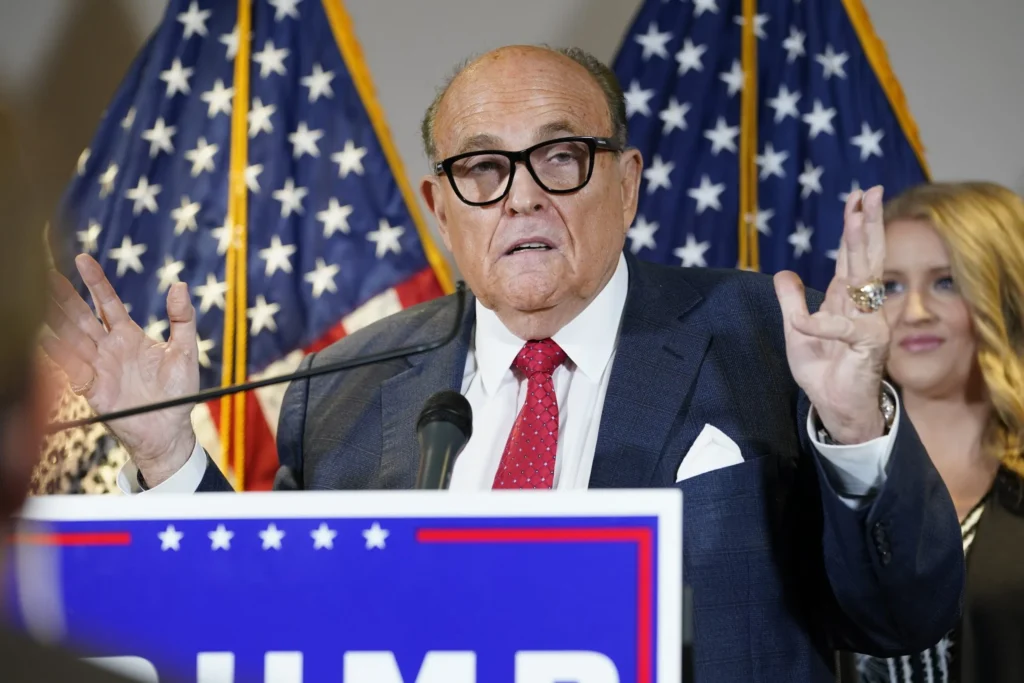a stunning turn of events, former New York City mayor Rudy Giuliani, once a prominent figure in American politics, has filed for bankruptcy in federal court less than a week after being ordered to pay nearly $150 million to two former Georgia election workers for defamation. This marks another low point in Giuliani’s recent history, characterized by a series of controversial incidents and legal troubles stemming from his association with Donald Trump.
Giuliani’s Downfall: From Four Seasons Total Landscaping to Bankruptcy
Giuliani’s reputation hit rock bottom with memorable incidents such as the press conference held at Four Seasons Total Landscaping and the infamous hair dye drip. However, the recent bankruptcy filing stands out as a new nadir in his political and financial trajectory. Once named Time magazine’s Person of the Year in 2001, Giuliani’s fall from grace has been nothing short of spectacular.
The bankruptcy filing comes in the aftermath of a jury’s verdict that ordered Giuliani to pay $150 million to Ruby Freeman and Shamus, two former Georgia election workers, for defamation. Giuliani’s lawyer expressed surprise at the bankruptcy move, emphasizing that the settlement with Freeman and Shamus is not the only financial challenge Giuliani faces.
Apart from the defamation case, Giuliani is grappling with a mountain of unpaid taxes amounting to nearly $1 million, debts to lawyers and accountants totaling hundreds of thousands of dollars, and the looming threat of additional defamation cases that are yet to go to trial.

Bankruptcy Filing and its Implications
Giuliani’s decision to file for Chapter 11 bankruptcy allows him to restructure his debts and attempt to allocate his remaining assets. The move raises questions about whether his creditors, including the IRS, will be able to recoup their losses. Already, lines have been filed on some of Giuliani’s properties, indicating the complexity of his financial situation.
emphasizing that the $2 million owed to lawyers and consultants, along with the outstanding tax debt, pales in comparison to the $150 million he owes Freeman and Shamus. The defamation verdict against Giuliani was deemed malicious, making it a debt that cannot be easily discharged through bankruptcy.
Pending Defamation Lawsuits and Uncertain Financial Future
As if the $150 million verdict wasn’t enough, Giuliani faces additional defamation lawsuits that could further strain his financial resources. Three lawsuits are related to statements he made after the 2020 election while representing Donald Trump. These include suits from a voting machine company employee, as well as major lawsuits from Dominion and Smartmatic, the voting machine companies. The outcome of these cases could result in significant financial penalties for Giuliani.
Jared Elias, a bankruptcy professor at Harvard Law School, weighed in on the unusual nature of Giuliani’s bankruptcy filing, especially considering his past wealth and professional stature. The process will involve a judge determining whether certain debts, such as those arising from intentional misconduct, can be discharged through bankruptcy.
Insights from Experts and Former Associates
Ken Freedman, a former spokesperson for Giuliani’s 1993 mayoral campaign, expressed little surprise at the bankruptcy filing, attributing it to the recent court ruling that mandated immediate payments to Freeman. The conversation also touched on Giuliani’s acknowledgment of defamation with malice in the 2020 election case, making it challenging for him to escape these legal consequences.
The discussion expanded to the potential consequences for Giuliani’s financial standing, including unpaid taxes and the distribution of assets to creditors. Despite the bankruptcy filing, Giuliani’s reported assets of one to $10 million indicate that he is not indigent, leaving open questions about the extent of his financial resources.
The panel also delved into the connection between Giuliani’s actions and his association with Donald Trump. Freedman suggested that Giuliani might not have taken the path of disseminating election lies and conspiracy theories if not for his association with the former president. The hold Trump has over Giuliani, evident in concerns about legal bills and potential flipping, adds an intriguing layer to this unfolding story.
In summary, Rudy Giuliani’s bankruptcy filing is a dramatic development in the aftermath of a costly defamation verdict. As he grapples with financial challenges and pending lawsuits, the former mayor’s association with Donald Trump continues to cast a shadow over his personal and professional life. The unfolding legal proceedings will undoubtedly shape Giuliani’s future and determine the extent of the financial fallout from his controversial actions.
